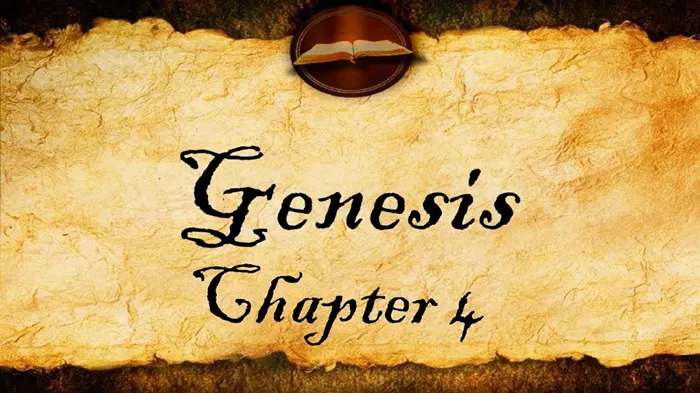Genesis Chapter 4 Summary
Genesis Chapter 4 tells the story of Cain and Abel, the sons of Adam and Eve. Cain, the firstborn, becomes a farmer, while Abel becomes a shepherd. When both brothers bring offerings to God, Abel’s offering of the firstborn of his flock is accepted, but Cain’s offering of the fruit of the ground is not. This rejection fills Cain with anger and jealousy. God warns Cain about the dangers of his anger, urging him to master it before it leads to sin.
Ignoring God’s warning, Cain invites Abel into the field and kills him, committing the first murder in human history. God confronts Cain, who denies knowledge of Abel’s whereabouts, uttering the famous line, “Am I my brother’s keeper?” As a consequence, God curses Cain, making him a wanderer on the earth. However, God also places a mark on Cain to protect him from being killed by others.
The chapter concludes with Cain’s descendants and the introduction of various professions such as farming, music, and metalwork. Meanwhile, Adam and Eve have another son, Seth, through whom the godly lineage continues. Genesis 4 highlights the destructive power of sin and the consequences of disobedience and envy.
Bible Genesis Chapter 4
Welcome to read Genesis Chapter 4. Here is the list of Genesis Chapter 4:
What Does Genesis 4 Teach Us?
1. The Nature of Worship and Offerings
Genesis 4 provides insight into the nature of worship and offerings to God. The distinction between Cain’s and Abel’s offerings highlights the importance of the heart’s attitude in worship. Abel’s offering, which is described as the “firstborn of his flock and of their fat portions” (Genesis 4:4), suggests that Abel gave his best to God. In contrast, Cain’s offering of “the fruit of the ground” (Genesis 4:3) seems less devoted. The lesson here is that God values not just the act of giving, but the sincerity and faith behind it. True worship is about giving God our best, with a heart full of faith and devotion.
2. The Destructive Power of Jealousy and Anger
The story of Cain and Abel serves as a powerful lesson on the destructive nature of jealousy and anger. Cain’s jealousy over God’s favor toward Abel leads to anger, which, when unchecked, results in murder. This progression shows how harboring negative emotions can lead to grave consequences if not addressed. God’s warning to Cain, “sin is crouching at the door. Its desire is contrary to you, but you must rule over it” (Genesis 4:7), emphasizes the importance of self-control and the need to resist the temptations that arise from negative emotions.
3. Personal Responsibility and Accountability
Cain’s response to God’s inquiry about Abel, “Am I my brother’s keeper?” (Genesis 4:9), underscores the theme of personal responsibility and accountability. Cain’s attempt to deny responsibility for his brother’s well-being reflects a broader human tendency to avoid accountability. However, the narrative makes it clear that God holds each person accountable for their actions. This teaching encourages us to recognize our responsibilities toward others and to act justly and compassionately in our relationships.
4. The Consequences of Sin
Genesis 4 vividly illustrates the consequences of sin. Cain’s murder of Abel leads to his own downfall. God’s judgment on Cain includes a curse that makes him a fugitive and wanderer, severing him from the land he tilled. Yet, even in judgment, there is a measure of grace; God marks Cain to protect him from being killed by others. This duality of justice and mercy teaches that while sin has serious consequences, God’s grace is still available, even to those who fall deeply into wrongdoing.
5. The Spread of Sin and Its Impact on Society
The chapter also highlights the spread of sin and its impact on society. Cain’s descendants, while achieving advancements in culture and technology, are also marked by moral decline. Lamech, a descendant of Cain, not only practices polygamy but also boasts about killing a man, further illustrating the spread of violence and the deepening of sin’s impact on humanity. This pattern shows how sin, once introduced, can grow and corrupt entire communities, affecting not just individuals but society as a whole.


